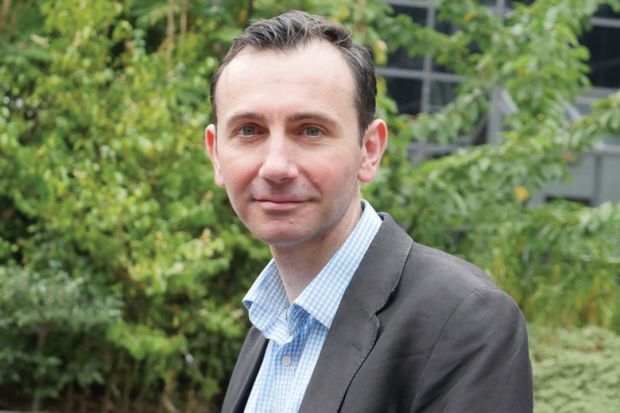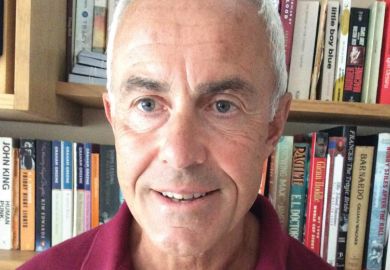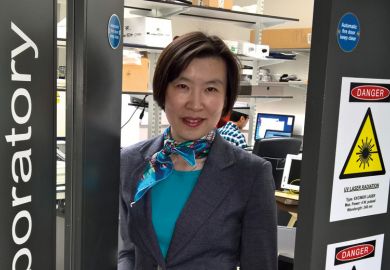Philip Carter is a historian and digital publishing specialist. He is currently senior research and publication editor of the Oxford Dictionary of National Biography (ODNB), the world’s largest collaborative research project in the humanities. The ODNB records the lives of 60,000 notable figures in British history, and it features more than 150 biographies from Dr Carter of people active between the 17th and the 20th century. In October he will join the Institute of Historical Research, part of the School of Advanced Study, University of London, as head of digital publications.
Where and when were you born?
I was born in the Roman city of Eboracum (York) in MCMLXX (1970).
How has this shaped you?
Growing up in a city so rich in Georgian architecture makes you wonder what went on in the streets and behind closed doors.
What is it like to be at the heart of the world’s largest collaborative humanities research project?
It’s a rare opportunity and great privilege to have been involved in so special and famous a work. But the ODNB is really a tribute to its 12,000 contributors, many of whom are humanities academics. For the profession to rise to a challenge like this, at a time of ever-growing commitments and accountability, is worth celebrating.
Did you ever feel daunted by the size of the task ahead of you?
I began as the dictionary’s 18th-century editor and so initially had a clear area to focus on within the larger project. It was the great innovation of the founding editor, the historian Colin Matthew, to create a highly devolved structure. This allowed talented people to bring their expertise to comprehensible parts of the whole. The scale of the project really became apparent when we started melding these parts into a single, consistent text.
Are you ever concerned about making an unnoticed mistake?
In a work of 72 million words, mistakes are inevitable. The guiding principle has always been: “better done than a perfect letter A”. Corrections are regularly made online, and we’re fortunate in having a generous readership who bring changes to our attention. More recently, there’s been a shift from correcting to amplifying entries, as new information is discovered.
Of the 150 people you added to the collection, is there anyone who stood out for you who might not be as well known to the public?
Many of my contributions are of 18th-century figures, but one who stands out is from a later period. Henry Croft (1861-1930) spent his life as a London road sweeper, but is known as the founder of the Pearly Kings and Queens. He shows what can be done using new resources and [highlights] how many ODNB biographies are exercises in first-time research. He’s also the only professional road sweeper among the 60,000 subjects.
Were there any others that you particularly enjoyed?
There are many, and it’s easy to keep coming across new ones: the fascinating later life of Sylvia Pankhurst was a recent discovery. The major biographies are written by well-known historians. Eric Hobsbawm on [Karl] Marx or Barbara Taylor on [Mary] Wollstonecraft are gems. Much, much shorter is the life of Thomas Emes, who was a member of the French Prophets, an 18th-century religious group. Fellow members predicted that Emes would rise from the dead on 25 May 1708, and a large crowd gathered in London to witness his (inevitable) non-appearance. As his entry concludes: “Emes’s fame rests not so much on any activity during his lifetime but on the absence of it following his death.”
The humanities are often criticised for not being utilitarian enough as a field of study. What are your responses to these criticisms?
Few would dispute that certain fields have greater instrumental value and application than others. But a civilised existence shouldn’t be either/or. For me, history’s distinctive value lies in its provision of context and perspective, something that’s important given our preoccupation with the here and now. The past is a dimension we’re poorer for not acknowledging and appreciating – like going about your day without the ability to see behind you.
What is the biggest misconception about your field of study?
Historical biography – once considered a dry approach to the past – has enjoyed a revival in recent years. “People” are back in vogue when it comes to writing history. But it’s still a struggle to convince academics and students that digital reference works like [ours] can be used for imaginative, original research, not just for “looking things up”.
What is the worst thing anyone has ever said about your academic work?
I remember reading out an undergraduate essay and being silenced by my tutor: “That will do, I see where this is all going.” I was still on page one.
What are the best and worst things about your job?
I spend a lot of time tracking down personal details of people in the past. To go from knowing almost nothing about a person to establishing his or her life story can be a curiously moving experience. Of course, sometimes the trail goes cold and the person disappears, which is frustrating.
What keeps you awake at night?
My cat, who’s partial to climbing wardrobes.
What’s your biggest regret?
Wasting time on “what ifs”?
What kind of undergraduate were you?
Serious, studious, curious, industrious, and no doubt pretty dull.
What’s your most memorable moment at university?
I went to university fully intending to specialise in 20th-century history. Then, in my first term, I took a course in Hanoverian culture and thereafter never went beyond the year 1800. That and chewing my way through a lychee at a candlelit high table dinner. No one told me you had to peel them.
If you were the UK higher education minister for a day, what policy would you immediately introduce to the sector?
Could banning work emails at weekends be considered?
Appointments
Andrea Nolan, vice‑chancellor of Edinburgh Napier University, has started work as convener of Universities Scotland. Professor Nolan, who was elected to the two-year post by her peer group of principals, is the first woman to hold the role. Universities Scotland represents all 19 of the country’s higher education institutions. “I am excited to take on the convenership of Universities Scotland at a time of many opportunities and challenges for higher education,” Professor Nolan said. “The commitment of our staff, the diversity of the sector and its excellence together enable our universities to make a significant contribution to Scottish society, culture and economy and on the world stage.”
Eric Verspoor, director of the Rivers and Lochs Institute at Inverness College, part of the University of the Highlands and Islands, has been awarded a personal chair in recognition of his expertise in aquatic biodiversity conservation and management. Professor Verspoor has worked in aquatic biodiversity as a researcher and adviser for more than three and a half decades, including 22 years as a principal scientific officer to the Scottish government. “The University of the Highlands and Islands provides a unique opportunity to pursue leading-edge pure and applied research and integrate this into undergraduate and postgraduate teaching to the benefit of the local Highlands and Islands communities,” he said.
The University of Oxford has announced three appointments. Karen O’Brien, vice-principal (education) at King’s College London, has been named head of the humanities division from September. Lloyd Pratt, associate professor of English at Oxford, has been appointed to the Drue Heinz professorship of American literature. Ian McBride, professor of Irish and British history at King’s, has been appointed to the Foster professorship of Irish history, from 1 October.
Sir Keith Burnett, vice-chancellor of the University of Sheffield, has joined the board of directors of the National Centre for Universities and Business.
POSTSCRIPT:
Print headline: HE & me
Register to continue
Why register?
- Registration is free and only takes a moment
- Once registered, you can read 3 articles a month
- Sign up for our newsletter
Subscribe
Or subscribe for unlimited access to:
- Unlimited access to news, views, insights & reviews
- Digital editions
- Digital access to THE’s university and college rankings analysis
Already registered or a current subscriber?






